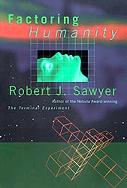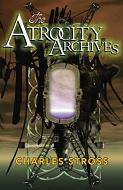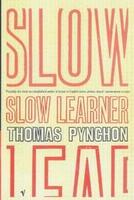 A few words on Robert J Sawyer's Factoring Humanity, an Alien Messages (SETI?) and First Contact story which spins a good if slightly over-egged and unrealistic (even within SF parameters) yarn. It was nominated for the Hugo Award, but didn't win it.
A few words on Robert J Sawyer's Factoring Humanity, an Alien Messages (SETI?) and First Contact story which spins a good if slightly over-egged and unrealistic (even within SF parameters) yarn. It was nominated for the Hugo Award, but didn't win it.
We are not alone. To the contrary – for almost 10 years now humanity has been receiving alien messages from the direction of Alpha Centauri A, roughly every 31h. The first 11 were easily decoded (nothing terribly exciting in there), the other 2832 have resisted every attempt to make sense of them. The only constant is that the number of bits transferred is, for each message, the product of two prime numbers (and no, not always the same ones either), which suggests that these should be interpreted graphically.
Heather Davis, of the University of Toronto, is the leading researcher on the topic (although no one knows much…), and an instant celebrity now that the transmissions have ceased to arrive. What do they mean? And why have they stopped? Are the aliens waiting for an answer before resuming?
Meanwhile her husband, living separated after the suicide of their older daughter, is teetering on the brink of a breakthrough in Quantum Computing, and is hoping to combine this with his ongoing research into APE – Approximate Psychological Experiments (essentially Simulated Intelligence) to create Quantum Consciousness.
But all is thrown into turmoil as Becky, Heather and Kyle's younger daughter, accuses her father of having molested her over years, something Kyle completely totally refutes, and has no memory of. But Heather is a Psychologist, and knows about suppressed memories, implanted memories, and the many all-so-human effects in-between.
This book lays it on very thickly (sometimes too much) in several areas. The child abuse story is a core plot element, but is overdone, and there are other areas where abuse and rape etc enter the plot, too, not always to good effect, I wonder what was going round Sawyer's head when he wrote this...
In other areas we get rather unrealistic depictions of the abilities of the researchers involved, and the time taken to solve riddles and come up with the correct answers to questions. Or how quickly people learn to handle new skills required, for example to control alien artefacts. It's all just too easy, too slick, just ever so not realistic and human. It actually reminds of CSI, and how somehow somebody always points their torch the right way, finds the crucial clue, and quickly interprets it the right way. Too many 'Eureka!' moments, to put it differently.
The setting is classic Sawyer, with the researchers and the University setting, mainly told in the 3rd person from the viewpoint of the two protagonists. The overall topics are more speculative (4-dimensional 'psychospace', anyone) than what I'm used to from Sawyer, and some of the established concepts he uses (eg Tesseracts) he understands insufficiently, which leads to some bloopers when one looks at details. Yes, I know, picky, and minor, but it annoys me nevertheless, as it shows laziness in research (it's not always as easy as depicted in the story!).
Sawyer is Canadian (thus the typical setting in Toronto), and winner of a host of awards, including Hugo, Nebula, and the Aurora (twice). This book didn't win any accolades, though, and I see why, it's clearly not his best work. But.
Overall, despite the weak areas, this is an enjoyable and readable book with some interesting new takes on old topics, so worth reading for this alone (no, I won't spoil your fun). And it's typical Sawyer in writing style, so if you liked his other books then this is definitely worth your time.
Title: Factoring Humanity
Author: Robert J Sawyer
Reviewer: Markus
Reviewer URL: http://skating.thierstein.net
Publisher: Voyager/Harper Collins
Publication Date: 1999
Review Date: 080520
ISBN: 0006511864
Price: UKP 5.99
Pages: 348
Format: Paperback
Topic: SF
Topic: First Contact
More Robert J Sawyer














